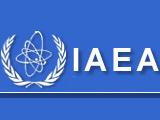|
|
TODAY.AZ / Politics
U.N. sleuths find plutonium at Iran atom site
15 November 2006 [15:29] - TODAY.AZ

The International Atomic Energy Agency report, obtained by Reuters, also said the U.N. watchdog still could not confirm Iran's nuclear intentions were entirely peaceful given its continued stonewalling of IAEA inquiries dating to 2003.
IAEA inspectors detected bits of plutonium in samples of particles of highly enriched uranium (HEU) taken earlier from containers at the Karaj atomic waste facility near Tehran. In larger amounts, plutonium and HEU can detonate atom bombs.
In response to IAEA queries, Iran said the HEU could have come from spent fuel from a Tehran light-water research reactor, the report said. Iran on Monday provided an explanation of the "slight plutonium contamination" now being assessed by the IAEA.
The report also confirmed Iran last month launched a second experimental chain of 164 centrifuges and began injecting them with uranium "UF6" gas for enrichment as nuclear fuel.
From August 13 to November 2, Iran fed some 34 kg (75 pounds) of UF6 into centrifuges at the Natanz plant, yielding nominal amounts of uranium enriched to low levels that could be suitable for power plant fuel, the report said. That would be far short of the 80 percent refinement needed for the core of a bomb.
Iran had run both chains, known as cascades, empty for vacuum-testing most of the time since reviving a pilot uranium enrichment drive early this year after a 2 1/2 year suspension.
"The amount of enriched uranium produced so far is too small for (use as fuel)," said a senior U.N. official familiar with the report by IAEA chief Mohamed ElBaradei.
This activity remained under constant IAEA surveillance. But Iran continued to hamstring agency investigators by preventing them from examining materials and interviewing officials and scientists linked to nuclear research, the report said.
"The Agency will remain unable to make further progress in its efforts to verify the absence of undeclared nuclear material and activities in Iran unless Iran addresses the long outstanding verification issues ... and provides the necessary transparency," said the report.
"Progress in this regard is the requisite for the Agency to be able to confirm the peaceful nature of Iran's nuclear programme," said the report, leaked as six world powers debate sanctions against Iran at the U.N. Security Council.
Tehran says its nuclear fuel program is solely for generating electricity. Western powers believe Iran, the world's fourth largest oil exporter, wants to master enrichment technology to be able to assemble nuclear bombs, something analysts say it could achieve in 3-10 years.
The reports said Iran still had not clarified questions about black-market acquisitions of material for centrifuge enrichment machines, and research linking uranium-ore processing, high-explosive tests and missile warhead design.
Other unresolved issues include the extent of research on a new generation of centrifuges that could enrich 2-3 times faster than the model now being used.
Iran continues to dodge an IAEA request to install remote monitoring devices at nuclear sites so that camera images could be transmitted straight to IAEA experts abroad, the report said.
A senior IAEA diplomat said the lack of remote monitoring in Iran would become a serious handicap for inspectors once Tehran installed several thousand centrifuges for "industrial-scale" enrichment, as it plans to do by the spring of 2007.
"At this time it is very difficult for our inspectors to move around in Iran. Once they expand to 3,000 centrifuges or more, remote monitoring will become more urgent, as long as Iran refuses to allow unannounced inspections," he told Reuters.
Iranian President Mahmoud Ahmadinejad said on Tuesday Iran aimed to install 60,000 centrifuges, up from 54,000 mentioned earlier.
A U.S. diplomat accused Iran seeking a clash on the nuclear issue. "Iran is looking for a confrontation with the world," U.S. Ambassador to the International Atomic Energy Agency Gregory Schulte said in an interview with Al Arabiya television. Reuters
URL: http://www.today.az/news/politics/32633.html
 Print version
Print version
Connect with us. Get latest news and updates.
See Also
- 12 February 2026 [14:14]
Baku and Washington have passed a verdict on the 907th Amendment - 12 February 2026 [11:11]
Rhymes won't help! - 11 February 2026 [14:14]
United States takes over nuclear security of South Caucasus - 11 February 2026 [13:32]
President Ilham Aliyev chairs meeting on Azerbaijan's new digital architecture action plan - 11 February 2026 [12:43]
President Ilham Aliyev receives delegation headed by President of Arab Parliament - 11 February 2026 [12:41]
CBA, U.S. Chamber of Commerce discuss expanding financial and investment cooperation - 11 February 2026 [11:25]
President Ilham Aliyev sends congratulatory letter to President of Iran - 11 February 2026 [11:09]
Footage of President Ilham Aliyev's meeting with U.S. Vice President JD Vance posted on his social media - 11 February 2026 [10:43]
U.S. Vice President JD Vance pays tribute to Azerbaijani martyrs in Baku - 10 February 2026 [14:32]
President Ilham Aliyev appoints new chairman of State Statistical Committee - decree
Most Popular
 United States takes over nuclear security of South Caucasus
United States takes over nuclear security of South Caucasus
 Baku and Washington have passed a verdict on the 907th Amendment
Baku and Washington have passed a verdict on the 907th Amendment
 G-77 and China Group hold plenary at UNESCO under Azerbaijan's chairmanship
G-77 and China Group hold plenary at UNESCO under Azerbaijan's chairmanship
 Defense concludes in Ruben Vardanyan trial, final verdict pending
Defense concludes in Ruben Vardanyan trial, final verdict pending
 Israel's Herzog hopes US talks can topple Iran's 'evil empire'
Israel's Herzog hopes US talks can topple Iran's 'evil empire'
 Reza Deghati's 'Rising Light' exhibition opens at Heydar Aliyev Int'l Airport
Reza Deghati's 'Rising Light' exhibition opens at Heydar Aliyev Int'l Airport
 Georgia targets completion of key transit highway linking Türkiye, Azerbaijan, and Armenia
Georgia targets completion of key transit highway linking Türkiye, Azerbaijan, and Armenia
